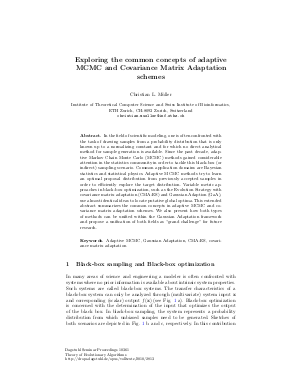Exploring the common concepts of adaptive MCMC and Covariance Matrix Adaptation schemes
Author Christian Lorenz Mueller
-
Part of:
Volume:
Dagstuhl Seminar Proceedings, Volume 10361
Part of: Series: Dagstuhl Seminar Proceedings (DagSemProc) - License:
 Creative Commons Attribution 4.0 International license
Creative Commons Attribution 4.0 International license
- Publication Date: 2010-11-24
File

PDF
DagSemProc.10361.3.pdf
- Filesize: 3.26 MB
- 10 pages
Document Identifiers
Subject Classification
Keywords
- Adaptive MCMC
- Gaussian Adaptation
- CMA-ES
- covari- ance matrix adaptation
Metrics
- Access Statistics
-
Total Accesses (updated on a weekly basis)
0PDF Downloads0Metadata Views
Abstract
In the field of scientific modeling, one is often confronted with the task of drawing samples from a probability distribution that is only known up to a normalizing constant and for which no direct analytical method for sample generation is available. Since the past decade, adaptive Markov Chain Monte Carlo (MCMC) methods gained considerable attention in the statistics community in order to tackle this black-box (or indirect) sampling scenario. Common application domains are Bayesian statistics and statistical physics. Adaptive MCMC methods try to learn an optimal proposal distribution from previously accepted samples in order to efficiently explore the target distribution. Variable metric ap- proaches in black-box optimization, such as the Evolution Strategy with covariance matrix adaptation (CMA-ES) and Gaussian Adaption (GaA), use almost identical ideas to locate putative global optima. This extended abstract summarizes the common concepts in adaptive MCMC and co- variance matrix adaptation schemes. We also present how both types of methods can be unified within the Gaussian Adaptation framework and propose a unification of both fields as “grand challenge” for future research.
Cite As Get BibTex
Christian Lorenz Mueller. Exploring the common concepts of adaptive MCMC and Covariance Matrix Adaptation schemes. In Theory of Evolutionary Algorithms. Dagstuhl Seminar Proceedings, Volume 10361, pp. 1-10, Schloss Dagstuhl – Leibniz-Zentrum für Informatik (2010)
https://doi.org/10.4230/DagSemProc.10361.3
BibTex
@InProceedings{mueller:DagSemProc.10361.3,
author = {Mueller, Christian Lorenz},
title = {{Exploring the common concepts of adaptive MCMC and Covariance Matrix Adaptation schemes}},
booktitle = {Theory of Evolutionary Algorithms},
pages = {1--10},
series = {Dagstuhl Seminar Proceedings (DagSemProc)},
ISSN = {1862-4405},
year = {2010},
volume = {10361},
editor = {Anne Auger and Jonathan L. Shapiro and L. Darrell Whitley and Carsten Witt},
publisher = {Schloss Dagstuhl -- Leibniz-Zentrum f{\"u}r Informatik},
address = {Dagstuhl, Germany},
URL = {https://drops.dagstuhl.de/entities/document/10.4230/DagSemProc.10361.3},
URN = {urn:nbn:de:0030-drops-28135},
doi = {10.4230/DagSemProc.10361.3},
annote = {Keywords: Adaptive MCMC, Gaussian Adaptation, CMA-ES, covari- ance matrix adaptation}
}
